Resistance
In early November, Democrats won several key elections up and down the ballot in states like Virginia, Georgia, Pennsylvania, and, perhaps most notably, in New York, where Zohran Mamdani became the first Muslim, South Asian, Democratic Socialist mayor-elect in New York City’s history. For voters concerned about the Republican Party’s authoritarian lurch, it was a reminder that political wins on the left are still possible.

I THOUGHT I understood “joy is an act of resistance” — a phrase first coined by poet Toi Derricotte — like the back of my hand. As someone who is neurodivergent and queer, my existence is political, and my thriving is defiant. Every joke I make, in particular my bad jokes, I make with a wink at all my haters. (The moral arc of the universe bends away from you and toward my bad jokes.)
That, surely, is joy as resistance — being ridiculous when many would rather I be dead. I feel this in my bones. Surely, I thought as I sat down to write this month’s column, I understand this concept well enough to teach my beloved readers how to achieve it in their own lives.
Friends, it turns out I do not actually feel this in my bones. It would be an understatement to say I struggled to write this column. I had to journal about it, talk it out with friends, and take a good long look at myself in the mirror to get to the heart (or the bones, I guess) of the problem, which was, surprisingly, a lack of feeling. A lack of bones? This metaphor is getting away from me.
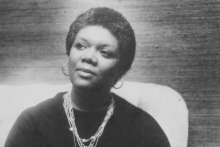
I was wrapping up some research in the Stuart A. Rose Manuscript, Archives, and Rare Book Library at Emory University when I requested a box of Lucille Clifton’s personal writings. I had not come to study Clifton. I was researching anti-lynching activism in Georgia, specifically a 1936 lynching photograph. But by the end of the week, I began turning to Clifton’s personal writing as an oasis. “Resolve to try to fear less and trust more and be healthy,” she wrote in her red Writer’s Digest Daily Diary on December 31, 1979. Clifton was a published children’s book author, memoirist, activist, and the poet laureate of Maryland when she wrote those words. She was also 43, the same age I was that September day. Her body of work, which includes Two-Headed Woman and Blessing the Boats, crossed oceans, told family stories, and revealed both the sting of injustice and the heart of what’s holy.
The day after Clifton resolved to “fear less and trust more and be healthy,” she wrote in her journal that she returned to a house with “no central heat; bad plumbing; and foreclosure.” A few weeks later, the house was auctioned off to the highest bidder. She sat down and wrote something anyway.
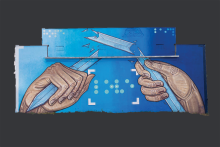
YOU NEVER KNOW where you’ll see the hands of Christ.
In central Kyiv, a mural depicting two elegant hands breaking a sword is surrounded by towering apartment buildings. Painted in 2016 by Ukrainian artist Sergii Radkevych, “Fragments of Hope” was one of a series of murals organized in response to the 2014 conflict in eastern Ukraine. It was public art on a mission to inspire a Ukrainian vision for peacemaking.
Radkevych combines religious iconography with street graffiti and realism. He pays particular attention to expressive hand gestures. “Fragments of Hope” became a frequent gathering point for protests in solidarity with eastern Ukrainians in 2017 and 2019. “This is my manifesto against violence and cruelty, a call to mutual understanding,” said Radkevych at the time. When I was in Kyiv in May, after more than three months of intensive Kremlin-led violence, I was grateful to find the mural still standing.

HABITS ARE FORMED in response to contextual cues. The stronger the cue, the harder it is for our minds to access alternative responses.
We just spent four years resisting. We became experts at pushing back, filling public squares, locking arms. Some of us also built habits of self-care. We would receive the cue for a big justice push and, without thinking, plan a day of hibernation on the other side. These habits were (and are) beautiful and necessary. But now we live in a new context. The old cues that triggered those habits will come less and less frequently. It is entirely possible that a year from now we could find ourselves coasting on autopilot rather than establishing new habits of dreaming and building what we dream.
By the end of the Civil War, 4 million enslaved people of African descent were sustaining themselves with survival habits cultivated and passed down over the course of 250 years. They found themselves in a brand-new context on April 10, 1865. Survival was no longer the highest goal. Now they were free to dream.
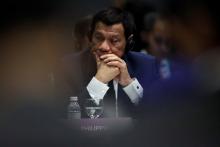
Impeachment suggests charging a president with misconduct that would disqualify them from public office — that’s not what Filipinos as asking for. Unseating Dutarte from office implies that there is a need for people power — a movement to assert democracy and not merely hang ones hopes in a system that has been known to fail or serve only a few. Impeachment calls the government to act, “unseat” calls the general masses to protest and hold government accountable.

CAROLYN FORCHÉ’S story begins more than 40 years ago, when the then-27-year-old poet opens her apartment door in California to a stranger from El Salvador. Leonel Gómez Vides—“Leonel,” as she refers to him throughout her book—spends several days outlining the situation in his country and making his case for Forché to come witness the roots of a revolution.
That Forché accepts such a calling, from January 1978 through March 1980 and for more than 40 years beyond, attests not only to her grit but also to her belief in the sanctity of the human spirit and the power of truth.
An awakening usually connotes a positive state of consciousness, yet Forché’s experience calls her to a grim, nightmarish landscape. Once her plane touches down in Ilopango, El Salvador, she ventures into a world in which nearly one in 10 children dies before the age of 5 and 80 percent of the population has no running water, electricity, or sanitation. To read Forché’s rich prose is to travel alongside her through the jungle, where she learns to squat over open pits to relieve herself, and follow her into palatial, private quarters, where she washes away the filth of the road before meeting with the military and civic leaders who want her dead. Beyond the poverty, the country devolves into a hell wherein mutilated bodies appear in the streets and political prisoners are kept in small cages, like animals.
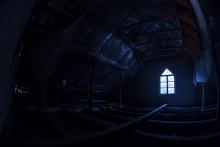
So now, here the church sits staring in the face of human rights violations being committed in our national name. Here we sit privy to the betrayal of anything we could possibly claim the gospel to be about — from the actual life story of Jesus and his dark-skinned, refugee family to the theological imperative to love one’s neighbor and stand with the most vulnerable. Here we sit bearing witness to breathtaking levels of racialized, religious violence being emboldened by this administration’s rhetoric and policies.
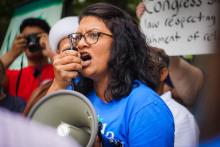
Today, civility policing is just one more layer of rhetorical fog which obscures the truth of our political reality ─ how poverty and cruelty are manufactured and sustained by the policy regime of America’s ruling class. In reality, the Trump tax cut is uncivil, the American support of Saudi Arabia’s war in Yemen is uncivil, the prison-industrial complex is uncivil, ripping families apart at the border is uncivil.

"WE ARE WHAT WE PRETEND TO BE,” Kurt Vonnegut once observed. “So we must be careful about what we pretend to be.” What a funny and paradoxical and intensely true thing to say. This is indeed the drill. The world runs on pretense. We play along with norms, strengthening their power as we go, borrowing a sense of legitimacy—sometimes trading in acts of legitimation with others—in the hope of being seen by others as credible and worthy of a salaried position.
If we aren’t careful, we learn to stop asking whether the reigning legitimacies in which we live and move are, in fact, good or worthy or true. When they aren’t, our pretense is a form of earnest wickedness. I’ve gained power, a tiny world of fake legitimacy, while slowly and dutifully forfeiting my soul. I’ve become what I’ve played at and lost any righteous sense of self and others in exchange for status. Henry David Thoreau described the way his own conscience sometimes succumbed to such peer pressure thusly: “The greater part of what my neighbors call good I believe in my soul to be bad, and if I repent of anything, it is very likely to be my good behavior. What demon possessed me that I behaved so well?”
We are, of course, responsible for our own words and actions, but we’re also responsible for the conflicts we avoid to more effectively get by, the lies we allow others to propagate unchallenged in our presence. Thoreau worried over all the ways he played along and didn’t raise a fuss in the face of the terrors his government enacted and the subtle fashion in which his own behavior, by proving polite and acceptable, abided injustice.

The work of liberation is long and hard, but music is one way we are sustained and renewed. I asked women in the throes of decolonization, activism, community organizing, pastoring, and liberative writing what songs encourage them as they engage in the work of justice and resistance. Here are their responses.

On the 20th anniversary of her canonization, we have the opportunity to reassess St. Edith Stein’s life and legacy. Instead of remembering her simply as a tragic victim, we can take a deeper look at the work she undertook during her lifetime. Over the course of four decades, Stein dedicated her life to civic engagement and political resistance. From volunteering with the Red Cross in World War I, to participating in the women’s suffrage movement in Prussia, to fighting for equal educational opportunities for women, to writing against the rise of the Nazi regime, Stein is much more than the “Holocaust martyr” – she is the patron saint of political resistance.

ROBERT HARVEY had a problem. The church he pastors was vandalized after the election: “Trump Nation. Whites only” was scrawled across its sign. His congregants, nearly 85 percent of whom are immigrants from West Africa, Latin America, and the Caribbean, were shaken.
The Southern Poverty Law Center reported 1,094 bias-related incidents across the country in the month after the election. The greatest number of these types of events are against women in public spaces who are also immigrants, Muslim, or African American. These are assumed to be a “small fraction of hate-related incidents,” as the Bureau of Justice Statistics estimates that two-thirds of hate crimes go unreported.
Harvey, rector of Episcopal Church of Our Saviour in Silver Spring, Md., decided to take action. First, he reached out to the local community and other religious congregations. Second, he signed up for a nonviolence and “active bystander intervention” training.
To understand how to be an “active bystander,” one must first understand the “passive bystander” effect. Research shows that when someone needs help and they are in a crowd, bystanders are less likely to act. The more bystanders there are to an event, the more each one thinks someone else will help.

At one time or another, we decided that the church is a body created to spiritually house and care for the world. But today in America, the word Christian has a lot of connotations to the average person. It’s confusing, and it brings up a lot of conversations about dividing lines and political parties and inclusion versus exclusion.

Jesus told his disciples to “take up their cross and follow me” a year before his trial and execution. And his disciples at that time would have heard it very differently from the way we interpret it today. To the disciples, a cross wasn't a symbol of atonement, forgiveness, or forbearance — it was an official mode of execution, by oppressors and occupiers. It was an instrument of terror. Jesus' words to the disciples were not just a warning. They were an exhortation to follow him anyway, in complete defiance of the very worst anyone could possibly do to us.

In this sense, Star Wars: The Last Jedi is an Advent movie. Director Rian Johnson’s wildly fun and thoughtful entry into the Star Wars canon finds its heroes at a precarious turning point. The film makes its characters grapple with the flaws of their established order, consider whether any of it is worth saving, and move forward by embracing the hopeful qualities of the Force and the Resistance.

This has been a devastatingly difficult year for many of us, to say the least — even for those of us whose homes and families haven’t been directly hit by any of the ongoing wars, natural disasters, or the reckless actions of the current president. Around this time last year, many in our country were insisting we needed to withhold judgment and give #45 a chance. While some church leaders led us in lament after the election, too many in our churches urged us to “wait and see.” More than 10 months in now, we’ve had time enough to witness more grievous offenses than we thought were possible from anyone in that office within such a brief period.

So much in the world needs to change, but the people doing the most to change the world are often zealous. I know I was — and self-righteous, too. Yet perpetual effort to forge a new world did not heal my soul; rather, it deepened my soul’s sense of separation from love. To put it theologically, a friend involved with left-wing Catholic Worker style communities describes a subtle culture of “not enough,” as communal embodiment of what Martin Luther called “works-righteousness.”

Focus on healing in movement spaces is often reserved for times of crisis — or is reduced to individual consumerist self-care like a glass of wine and a pedicure. In our leadership development, community cultivation, and organizing models, focusing on resilient, integrated, whole selves is considered extra — a fun and indulgent add-on to the “real work of organizing.”

These times of resistance are also heavy, and in the daily work that tethers us to the people who came before, we also have to stop, rest, and remember things like Sabbath, so that we don’t grow too weary. And I am weary. So when the weekend comes, our family carves out extra time to stop and breathe